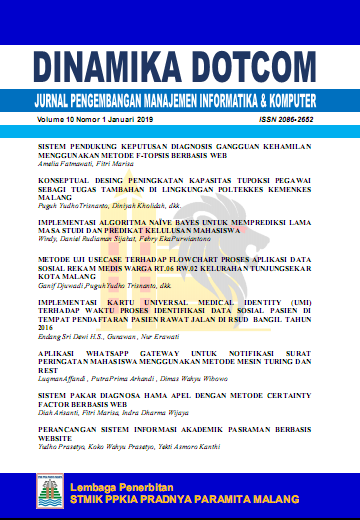IMPLEMENTASI ALGORITMA NAÏVE BAYES UNTUK MEMPREDIKSI LAMA MASA STUDI DAN PREDIKAT KELULUSAN MAHASISWA
Abstract
Informatics is one of the study programs at STIKI Malang which has quite large student data both data on active students and students who have graduated. Every year students who graduate on time are far less than new students, which will affect the quality of students and also influence to the accreditation of STIKI Malang. Therefore, the purpose of this study is to make an application to predict the duration of study and the predicate of student graduation by applying supervised learning techniques. Output predictions for the period of study are on time, late, or not graduated and output for predicate are summa cum laude, cum laude, very satisfying, or satisfying. The application method used in supervised learning for prediction is a Naïve Bayes algorithm. This is used to analyze data, especially in the pattern recognition process, predicting the period of study and the predicate of graduation. Before entering the calculation phase of the Naive Bayes algorithm, the Correlation Feature Selection is used to select relevant features that function to improve the accuracy of the system. The results of the study based on 10 Fold Cross Validation testing indicate that the application can be used to assist informatics study programs in order to find strategic information related to the duration of study and the predicate of student graduation with an accuracy of 77.19% and 87.65%.
Keywords: Prediction, Naïve Bayes, Study Periods, Correlation Feature Selection,10 Fold Cross Validation
References
I. A. A. Amra and A. Y. A. Maghari, “Students performance prediction using KNN and Naïve Bayesian,” in ICIT 2017 - 8th International Conference on Information Technology, Proceedings, 2017.
Harwati, R. I. Virdyanawaty, and A. Mansur, “Drop out Estimation Students based on the Study Period: Comparisonbetween Naïve Bayes and Support Vector Machines Algorithm Methods,” in IOP Conference Series: Materials Science and Engineering, 2016.
M. Makhtar, H. Nawang, and S. N. W. Shamsuddin, “Analysis on students performance using naÏve Bayes classifier,” J. Theor. Appl. Inf. Technol., 2017.
M. A. Nurrohmat, “Aplikasi Pemrediksi Masa Studi dan Predikat Kelulusan Mahasiswa Informatika Universitas Muhammadiyah Surakarta Menggunakan Metode Naive Bayes,” Khazanah Inform. J. Ilmu Komput. dan Inform., 2015.
A. Chandra, “PERBEDAAN SUPERVISED AND UNSUPERVISED LEARNING,” https://www.datascience.or.id, 2017. [Online]. Available: https://www.datascience.or.id/article/Perbedaan-Supervised-and-Unsupervised-Learning-5a8fa6e6. [Accessed: 30-May-2018].
Bustami, “Penerapan Algoritma Naive Bayes,” J. Inform., 2014.
Z. H. Kilimci and M. C. Ganiz, “Evaluation of classification models for language processing,” in INISTA 2015 - 2015 International Symposium on Innovations in Intelligent SysTems and Applications, Proceedings, 2015.
Kemdikbud, “KBBI Daring,” KBBI Daring, 2016. [Online]. Available: https://kbbi.kemdikbud.go.id/entri/sarjana.
E. Poerbaningtyas, L. Isyriyah, and S. Widodo, BUKU PEDOMAN AKADEMIK. Malang: STIKI Malang, 2015.
M. Doshi, “Correlation Based Feature Selection (Cfs) Technique To Predict Student Perfromance,” Int. J. Comput. Networks Commun., 2014.
A. Wibowo, “10 Fold Cross Validation,” https://mti.binus.ac.id, 2017. [Online]. Available: https://mti.binus.ac.id/2017/11/24/10-fold-cross-validation/.
M. Sokolova and G. Lapalme, “A systematic analysis of performance measures for classification tasks,” Inf. Process. Manag., 2009.
F. E. Purwiantono and A. Tjahyanto, “Classification model based on url and content feature approach for detection phishing website in Indonesia,” J. Theor. Appl. Inf. Technol., 2017.


